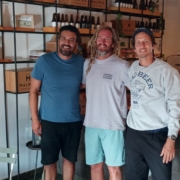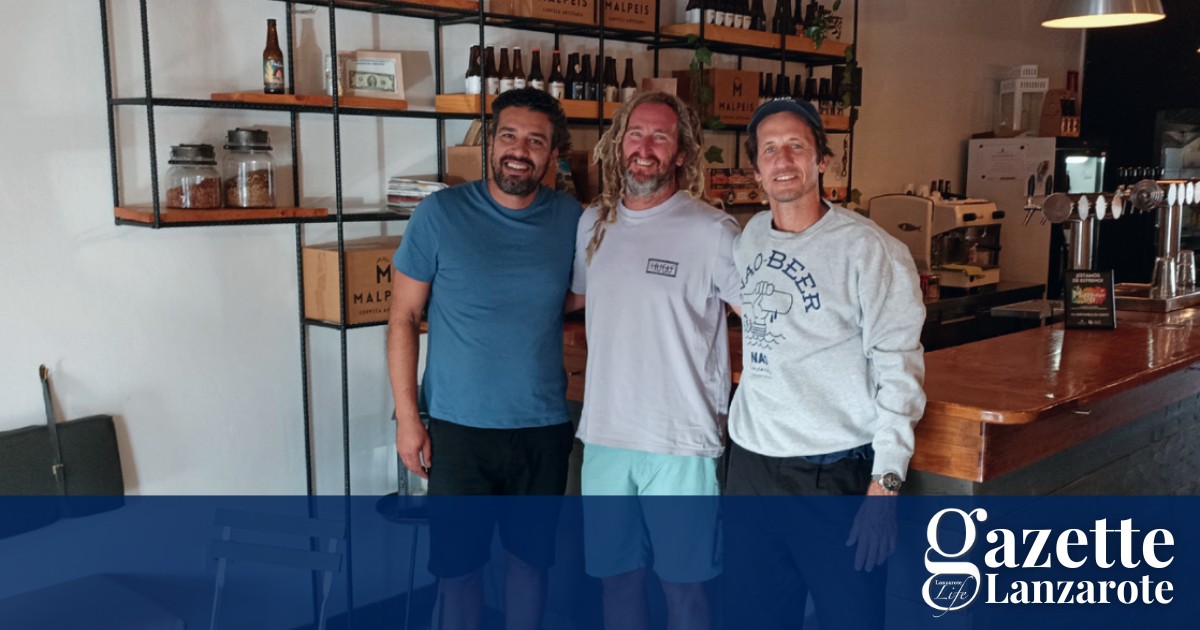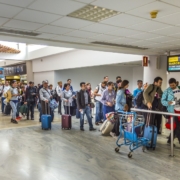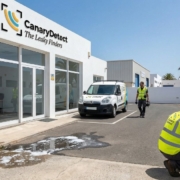Long famous for its wine, Lanzarote is now the most important of the Canary Islands for craft beer production, with three well-established microbreweries producing a tempting range of high-quality beers. We spoke to the island’s three pioneer brewers last month.
Lanzarote’s three craft breweries, Nao, Dos Cabras and Malpeis, recently combined to form ACLAN, the Lanzarote Brewer’s Association. It’s the latest stage in a story that began over ten years ago, when Argentinian restaurant owner Hernán Martín brewed the first craft beer to be sold on Lanzarote.
At the time, Hernán was in charge of the Los Aljibes restaurant in Tahiche, an impressive, sprawling place that was designed by César Manrique in 1976. He said “After years of working in restaurants I finally had space to do what I wanted, so I bought equipment and started brewing.” Agüita, the beer he created with his colleague Gavin Longworth, was only sold at the restaurant, although Hernán, unmistakeable in his La Graciosa straw hat, is a regular at the island’s food fairs.
At around the same time, musician Orlando Niz was experimenting with brewing in his garage in Tinajo and sharing the increasingly professional results with his friends. His partner, wine expert Tania Delgado, brought greater control to the process and the couple soon launched Malpeis. This brewery has become the largest producer on the island, brewing around 75,000 litres a year, and its bars in Tinajo and Masdache are firm favourites with locals and visitors.
The final member of the trinity is Miguel Lasso, who opened the Nao microbrewery in Arrecife’s historic fishing barrio in 2015. Located in a 19th century building where nets used to be mended, the Nao brewery and bar is a little jewel hidden in one of the most fascinating corners of the capital, and the meticulously-brewed beers have won several national awards.
Between them, the three brewers estimate that they produce around 175,000 litres of beer a year (an impressive figure considering that the island’s annual wine production is two million litres) and the undoubted quality of their products shows what ten years of experience brings. All of them import high quality raw materials from abroad (there is no production of malt or hops on the Canaries), and they do not use the ingredients that the big industrial brewers use all the time, such as malt derived from rice or maize, flavour enhancers or added carbon dioxide. “It’s all barley and wheat,” says Orlando.
As much as ingredients, it’s the skill of brewing that counts, and the gleaming vats in the breweries are evidence of a meticulous labour of love. Asked what the secret of brewing is, Hernán replies that there are three golden rules: “Cleanliness, cleanliness and cleanliness” and the other two nod in agreement.
The three brewers met while presenting their products at local food fairs, where they realised that they faced similar problems and challenges. But the newly-formed association is not a merger “We’re still competitors,” smiles Hernán, and it is clear that each of the breweries is doing different things. Dos Cabras, for example, is the only one currently producing beer in cans: “It’s scientifically proven that canning preserves beer better,” says Hernán. The other two aren’t so convinced, admitting that bottles are seen as having higher status by consumers.
What the association aims to do is give these local brewers more heft when negotiating with the authorities, ensuring that they are not overlooked in favour of the industrial breweries which have much deeper pockets. The association will also work with similar groups on the other Canary Islands and association status will help secure the business grants and subsidies that are essential for smaller companies.
Beer has been the most popular drink in Spain for some time now, and there’s been plenty of local support for Lanzarote’s craft breweries although Orlando says that locals sometimes complain about the price of the product, which can’t possibly match those of the industrial brewers. All three brewers produce fascinating ranges that, between them, include glutenand alcohol-free beers, stouts, IPAs, wheat beers and fruit- or spice-flavoured brews.
The interest and support of tourists and foreign residents has also been key. Hernán says he’s always pleased to get praise from British, Irish, Belgian and German customers who “know their beer.”
All three brewers have been taking advantage of the slightly less busy months of May and June to develop new products, meaning there’s no better time to discover Lanzarote’s thriving craft beers than right now. Don’t miss out – this is good beer.
LANZAROTE’S 3 BREWERIES
Dos Cabras: Hells lager, IPA, dark Oktoberfest, light bergamot summer ale, a Porter. Go to website for list of stockists. 223 Carretera San Bartolome, Arrecife. www.2cabras.com
Malpeis: light Jable, hoppy, intense Bermeja and fruity, malty Rofe, as well as at least nine other, varieties of beer including a stout, a wheat beer, a hazy IPA, and spicy and fruity brews. Plaza de San Roque 3, Tinajo. www.malpeis.com
Nao: Several beers including Marinera blonde ale, Mucho IPA, Atlantic lager, Capitán pale ale, black Patrón, wheat beer and a “volcanic grape ale” that includes local Malvasia grapes. C/ Foque No. 5, Arrecife. www.naobeer.com











Leave a Reply
Want to join the discussion?Feel free to contribute!